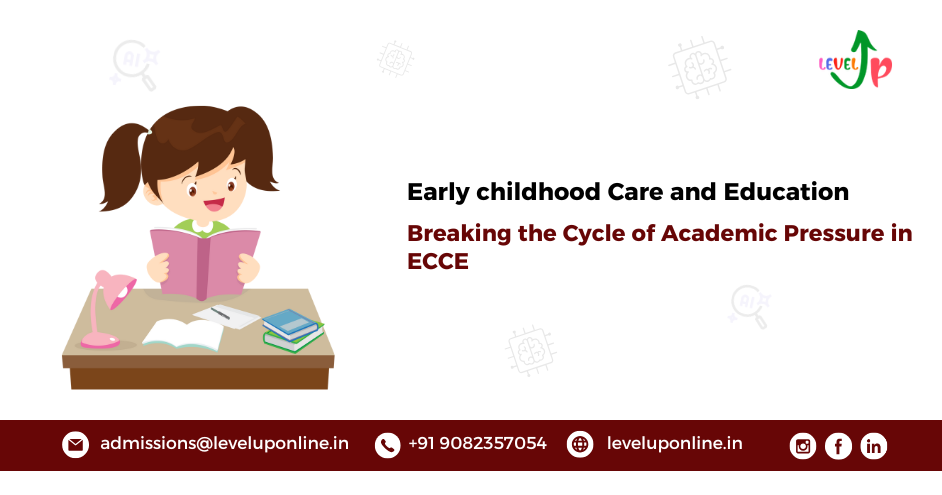Introduction
In an age where toddlers are expected to recite alphabets and solve math puzzles before they turn four, the race for academic excellence is beginning far too early. This growing trend is feeding into what experts now recognize as academic pressure in ECCE (Early Childhood Care and Education)—a widespread issue where structured academics are prioritized at the cost of a child’s natural growth and joy of learning.
This blog explores how academic pressure in ECCE is not only counterproductive but potentially harmful, and how parents and educators can work together to return early education to what it’s truly meant to be: a time of curiosity, creativity, emotional connection, and discovery.
What Is Academic Pressure in ECCE?
Academic pressure in ECCE refers to the unrealistic expectations placed on very young children to master academic skills like reading, writing, and arithmetic prematurely. This pressure is evident in:
1. Overuse of worksheets and drills
2. Over-scheduled days with little time for play
3. Early standardized testing or assessments
4. Competitive comparisons among peers
While some level of school readiness is important, forcing structured academics in the early years can override developmental needs, particularly in areas like emotional intelligence, motor skills, and imagination—all of which are cornerstones of effective ECCE.
Why Is Academic Pressure in ECCE a Growing Concern?
1. It Disrupts Natural Learning Processes
Young children learn best through hands-on play, exploration, and social interaction. When the emphasis shifts to memorization and performance, we undermine their natural learning processes. Academic pressure in ECCE forces children to function in ways that don’t align with their developmental stage.
2. It Impacts Mental and Emotional Well-being
Several studies show that early academic stress can lead to anxiety, low self-esteem, and even aversion to school later in life. Children experiencing academic pressure in ECCE may internalize the idea that they are “failures” if they don’t meet adult-driven benchmarks.
3. It Creates Imbalance in Development
Focusing solely on academic skills often sidelines critical areas like emotional regulation, physical coordination, creativity, and socialization. A well-rounded ECCE framework aims to nurture the whole child—not just the cognitive aspect.
The ECCE Approach: A Healthier Alternative
High-quality Early Childhood Care and Education (ECCE) settings offer a developmentally appropriate curriculum where learning is child-led and play-based.
Focus on Holistic Growth
Instead of isolating literacy and numeracy, ECCE nurtures all areas of development—social, emotional, physical, cognitive, and language—reducing the need for academic pressure in ECCE environments.
Learning Through Play
Play is the most effective mode of learning for young children. It builds problem-solving skills, cooperation, language, and emotional intelligence. In well-designed ECCE programs, play is not a luxury—it’s the curriculum.
Safe and Nurturing Environment
Children thrive when they feel safe and supported. ECCE educators are trained to observe, respond to, and guide children without inducing fear of failure or comparison. This minimizes academic pressure in ECCE settings and fosters a love of learning.
How Parents Can Resist Academic Pressure
Parents are often unknowingly pulled into the trap of early academic success due to peer influence, societal expectations, or marketing by educational apps and centers. Here’s how to break free:
1. Change the Narrative of Success
Instead of asking, “Can my child read yet?” try asking, “Is my child happy, curious, and kind?” These are the true goals of early learning and protect your child from academic pressure in ECCE.
2. Embrace Play at Home
Prioritize unstructured playtime. Allow your child to explore mud, build with blocks, invent stories, or help in the kitchen. These activities build lifelong skills, without the stress of meeting academic milestones.
3. Select ECCE Programs Thoughtfully
Choose preschools and daycare centers that are aligned with ECCE philosophies—those that offer open-ended play, focus on emotional development, and don’t rush academics. Ask how they avoid academic pressure in ECCE during admission discussions.
The Educator’s Role in Reducing Academic Pressure
Educators are often stuck between parental demands and educational mandates. Yet, their role is crucial in shifting the paradigm.
Advocate for Play-Based Learning
Use your voice and expertise to educate parents on the dangers of academic pressure in ECCE. Share research, host sessions, and demonstrate how play leads to meaningful learning.
Assess Holistically
Move away from report cards and instead use portfolios, pictures, observational notes, and conversations to assess development. These tools help track a child’s journey without adding pressure.
Create Child-Centered Classrooms
Let children take the lead in what and how they learn. Encourage exploration, celebrate effort over outcome, and validate each child’s unique strengths.
A Real-Life Snapshot: Breaking the Pattern
Six-year-old Mia was once in a program that emphasized worksheets, spelling tests, and math drills. Her parents, concerned about her anxiety, moved her to a play-based ECCE center. Within months, Mia began to enjoy learning again. She asked questions, made friends, and became more confident. Her language skills soared—not from phonics classes but from storytelling and role-play. Her story is proof that breaking free from academic pressure in ECCE allows children to thrive.
The Way Forward
The early years should be filled with wonder, not worry. The goal of education at this stage isn’t to produce mini-geniuses but to create emotionally secure, curious, and confident learners.
To truly break the cycle of academic pressure in ECCE, we must:
1. Trust in children’s natural abilities
2. Respect the rhythms of childhood
3. Value learning in all its forms—not just the measurable ones
Let’s build a future where no child fears school, where joy fuels learning, and where every child is free to grow at their own pace.


